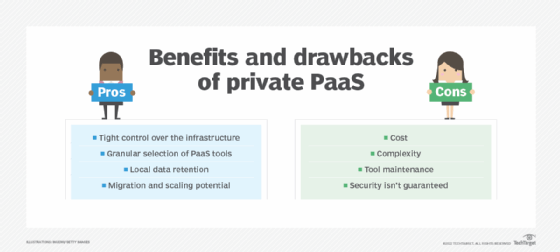private platform as a service (private PaaS)
What is private PaaS?
Private platform as a service (private PaaS) is software that facilitates development, deployment and operations for IT on a private infrastructure or behind a firewall.
Like public PaaS, private PaaS lets application developers design, code, test, deploy and manage their organizations' cloud-based systems. Developers have greater control over the more nimble private PaaS, but that control comes with added responsibilities and expenses involved with owning and operating IT infrastructure and software tools. The hardware and software needed to support private PaaS must be bought, set up and maintained by the customer's IT department.
What's the difference between public and private PaaS?
Consider that public PaaS is typically a suite of software built on a public cloud. For example, Microsoft Azure PaaS runs on top of the Azure cloud infrastructure (IaaS), while Google App Engine runs on top of Google Compute Engine. This is a tried and true approach to many public cloud services, but public PaaS is closely tied to the associated public cloud.
For some organizations, public clouds and public PaaS pose concerns, and regulatory restrictions about control, security and compliance prompted some vendors to begin offering private PaaS. Thus, as with a private cloud, a private PaaS must be implemented by deploying suitable applications and services on the organization's private cloud.
This article is part of
What is PaaS? Platform as a service definition and guide
Because a private PaaS runs on a private cloud, a private PaaS takes on many of the characteristics and capabilities found in a private cloud infrastructure, such as the ability to scale to a public cloud or become a hybrid cloud when extra processing is needed, and the ability to develop cloud applications that couldn't exist in the public cloud for security reasons. Private PaaS also consolidates a company's cloud development into one environment. Nevertheless, private PaaS attracts customers with concerns about shadow IT and rogue applications developed on public PaaS.

Pros and cons of private PaaS
A private PaaS is designed to provide a suite of tools and services deployed on a private cloud infrastructure. The PaaS then exists as a software/service layer atop underlying private cloud software and hardware. Thus, the trade-offs of a private PaaS largely reflect the pros and cons of a private cloud. For example, private PaaS advantages include:
- Tight control over the infrastructure. A PaaS is a software layer and it requires an infrastructure on which to run -- typically a private cloud provisioned and implemented in the organization's own data center, though a private PaaS can also be designed and built on a public cloud IaaS if desired. This means the business owns and operates the infrastructure, software components, local networks and so on. The business can use this control to meet prevailing security and regulatory requirements.
- Granular selection of PaaS tools. Where a public PaaS typically offers a suite of pre-selected and integrated tools, a private PaaS enables the business to select -- even develop -- and deploy its own suite of PaaS tools. A business might create a PaaS to enable unique business needs where no other public PaaS exists.
- Local data retention. Where public PaaS will typically store the platform's data in the public cloud, a private PaaS will store the data in private cloud storage resources -- keeping data local and further strengthening the security and control that private infrastructures provide.
- Migration and scaling potential. As with any public cloud, there is a potential for a business to migrate to a public cloud later or implement a hybrid cloud infrastructure that can enable a private cloud to use a public cloud for scalability on demand. This can enable a private PaaS to use elements of a public cloud for additional computing or storage if needed.
In spite of these advantages, organizations must carefully consider an array of potential issues and disadvantages of private PaaS, including:
- Cost. The central advantage of a public PaaS is convenience -- another business actually owns and operates the PaaS. This makes public PaaS well-suited for businesses that seek to shed IT infrastructure and support. Creating a private PaaS involves all of the costs and labor involved in designing, deploying and managing the private cloud infrastructure, as well as the PaaS software suite. Thus, building a private PaaS can be a costly and time-consuming endeavor.
- Complexity. A private PaaS requires the added complexity of hardware infrastructure, a private cloud layer and the PaaS software tools. A business must be prepared to invest in the infrastructure architecture, engineering and support needed to build and operate a private cloud infrastructure, which can present greater complexity than a business needs or wants in the everyday IT environment.
- Tool maintenance. In addition to managing any private cloud software layer, a private PaaS can involve a wide array of software tools, such as software integrated development environments (IDEs), testing tools, deployment tools and repositories. Every one of the tools involved in a private PaaS must be evaluated, procured, licensed, deployed, maintained and updated. If any tools are developed and built in-house, those tools might also need to be maintained throughout their respective lifecycles.
- Security isn't guaranteed. The creation of a private cloud and private PaaS doesn't automatically guarantee security of the tools or resulting data. Security must be an integral part of the design, configuration and ongoing monitoring of any private IT environment, including private clouds and private PaaS.
Examples of private PaaS
Because a private PaaS is fundamentally a set of proprietary tools and services built on a private cloud, there are few commercial examples of a private PaaS. The implementations can vary widely in scope, purpose and capability depending on the needs of the individual organization. Thus, vendors with strong private cloud lineage are often linked to private PaaS, such as:
- Apprenda
- CloudBees
- HPE Helion Stackato (formerly ActiveState's Stackato)
- Red Hat OpenShift
But these examples primarily support the underpinnings of a private cloud. The actual services that comprise a private platform can be as diverse as the business itself, and might include software tools licensed from an array of third-party vendors -- such as Git, Salt, Jenkins or integrated development environments for countless programming languages used in software development platforms -- along with any number of custom software tools built and maintained in-house.






